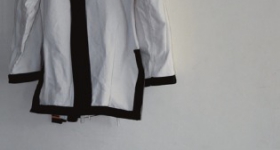1
I might meet her for the first time on a streetcar.
I might be distracted, might not notice her at first because I am listening to the conversation happening behind me. I might wonder if it’s a break up; might become invested; might feel anger on behalf of the more rational half of the squabble. I might be tempted to turn my head back to get a better view of the conversation; to put faces to voices to feelings.
But, as the streetcar approaches Kai Wei Supermarket, she might finally move past me to pull the yellow cord near the window to signal her stop. Might tap me gently on the shoulder so I finally budge. Or, perhaps I’m not in the way at all, and it’s just a little smile as she pulls the cord, her eyebrows lifting upward in a kind way. She might have a perm, might be wearing a knit cardigan, might be pulling a small fabric grocery cart behind her. And in that moment, I might realize who she is, my stomach lurching forward.
Sorry! might come out of my mouth, a hoarse whisper, if I am taken aback by seeing her in person for the first time. Her! — someone I’d only ever seen in photos, someone that I was certain was no longer here, someone whose ashes I’d bowed down to three times, annually, since I learned how to bow.
She might start turning around as the streetcar doors open, becoming one of many pedestrians about to spill out onto the busy street to buy their green vegetables and tofu skins. I might gather courage to speak again, a louder whisper, to ask her as she is turning away: Hello! Hello! Are you who I think?
She might turn around, sensing the question is directed to her, looking at me somewhat blankly. She might not understand, so I might try again, adjusting myself with shaky Cantonese: Nai hai mai — I might trail off, searching for a name in my head. Though: I don’t have a name for her, I never have. I might wonder, at that moment, whether family trees, knowable histories, are only for people not like us.
A bell might ring as the streetcar doors close with my mouth mid-sentence, and the woman I am certain is my poh poh might carry on with her afternoon, slowly walking down the sidewalk, her empty grocery cart rolling behind her.
2
Or: I might try to meet her in some unknown future, when there’s an online dating app for connecting family members. And so, not really an online dating app at all. OkCupid for the estranged, dead, separated at birth.
The ad on my phone reads: Sign up to find a long-lost (un-/not yet/might have) loved one today!
It shows a photo of two yellow-haired identical twins looking at their phones on different sides of the world. They are blue-eyed and optimistic. It is a flashy ad, and I am curious. People have been posting about it on Twitter. Some wild stories out there. I sign up.
I draw a radius of 12,000 km, though I can’t quite do the math in my head. Would she still be in Scarborough, Hong Kong or somewhere in Macau? I tap a few buttons to say I’m looking for a woman, aged 70 to 90. I’m not sure what age her form might take. I tap around the screen some more, adding two profile photos of myself, hoping that she’ll recognize them: a baby photo — how she would have known me, even if ever so briefly, and a more recent photo of myself, one where everyone tells me I look like my mom. I think to myself that this one might feel familiar, might help her recognize me, too.
Swiping comes naturally — it’s the same as it always is: a quick motion left with my thumb means a pass. There’s only one person I’m looking for, so I know the chances of swiping right are low. I swipe left. I swipe left. I swipe left. I swipe left. I swipe left over, and over, to a sea of wrinkled faces; some smiling, some looking forlorn. Some have bios typed up under their photo. A South Asian woman who looks to be in her early 70s, her graying hair in a long braid, writes: New to this app! Just trying it out, thinking my son might be looking for me. There is the emoji with the two eyes looking to the left beside the text.
I pause to read the bios and look at the photos occasionally, once every few swipes or so. I cannot decide if I find them sweet or terribly depressing.
I swipe left on many elderly Chinese women of varying degrees of elderly-ness. I find many of their profiles endearing, but none of them are poh poh. I have an old photo for reference that I took from an old photo album inside my mom’s dresser that I hold beside my phone as I swipe, just to be sure. I worry that maybe, in my rush to swipe, I have missed her. I grow frustrated, lamenting how inefficient the algorithm is, knowing that the technology is intentionally imperfect so that I will stay using the app longer.
I realize something like three hours have passed when I look at the clock and it reads 2 am. I give up, falling asleep with my phone in my hand. In a drowsy daze, I think to myself that perhaps I’ll try again tomorrow evening. And sinking further into sleep, I think: perhaps I will not — I wasn’t quite sure what I would say if we found each other, anyway.
3
I am sitting on the carpet of my childhood home, wondering if it is possible to miss someone I have never met.
4
I am sitting on the carpet of my childhood home, wondering if it is possible to miss someone I have never met.
I am holding an old photograph of my poh poh. In it, she looks to be in her mid-70s. She has a small frame and is sitting on the front steps outside a suburban home, her legs folded up against her chest, her arms draped casually over her knees, her hands crossed over one another. She wears a traditional-looking pant and shirt, one with an old-fashioned collar; I don’t quite have the vocabulary to properly describe it without feeling like I’m exoticizing where I come from. She is smiling, and I can see my mom’s features on her face. I can see my features, too — the crevice around our mouths, our upturned eyebrows. I feel a sense of longing.
Is it the sadness of not knowing enough to forget? I wonder if it is possible to miss someone I have never met.
5
During my pre-teen years, I would often wake up to darkness, a weight pulling my body downward. I could still feel my own breathing and be able to dart my eyes around the room, but my limbs were always cemented in place. I shared a room with my sister and I’d see her out of the corner of my eye, try to scream out to her, but my mouth would barely open. I could never be certain if anything audible was coming out of my body, though I always thought I was screaming, Help.
My just-pubescent body eventually became accustomed to these occasional paralyses in the night. I would tell myself to remain calm, and with all my might and all matter of concentration, I would focus on a single limb, and with incredible force, nudge it upward. Only then could I break out of this state.
I remember that when I told my friends at school about my sleep paralysis, they all thought I was some kook making it up. I knew it was real though, because I joined a Facebook group called People Who Have Experienced And/Or Continue to Experience Sleep Paralysis filled mostly with white adults in their 30s to 50s from around the world. Once, I mentioned it to my mom over dinner. I asked her: Do you ever get stuck in your sleep, like you feel totally frozen? She told me that she often did, that it always felt like there is a ghost sitting on her body and that it happened the most when she was younger.
Later that night, I googled: sleep paralysis ghost. On Google Scholar, I found an article titled: Sleep Paralysis in Chinese: Ghost Oppression Phenomenon in Hong Kong (Wing et al, 1994). I wondered if my mom knew that other Chinese people with sleep paralysis also thought they had a ghost sitting and pushing down on them, or if she just knew it was a ghost because she was Chinese.
The sleep paralysis usually came when I stayed up too late. Even in those early years, I often couldn’t sleep at night. I stayed up because of a bad feeling. I didn’t have a word for the bad feeling, and I’d never spent a night in another bed, but I imagined that this was what homesickness felt like. All I knew was that I was not where I should be, that there might be another place that was more familiar, more comforting, where everything might be in place. That there was this other place that I did not know, and had never been to, and might have already forgotten.
I imagined that in that place, there would be people, too.
I imagined that those people might look like me.
I wondered if it was possible to miss someone I had never met.










Comments